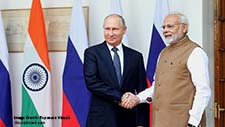Publications
The Institute for Security and Development Policy regularly issues a variety of publications ranging from shorter Policy Briefs to more comprehensive studies in its Asia and Silk Road Papers series. Explore the different series below. If you’d like to contribute to our publications, please contact Jagannath Panda, Editor, at jpanda@isdp.eu, and read our submission guidelines.
-
Taiwan in the European Discourse: Toward Political Consensus?
Abstract: The EU’s Strategy for Cooperation in the Indo-Pacific recognizes that the display of force in the Taiwan Strait may have a direct impact on European security and prosperity. In […]
-
U.S.-ASEAN Summit: Democracy Promotion on the Backburner
Abstract: As democracy comes under acute threat from rising authoritarianism across Southeast Asia, this issue brief explores whether there is a loss of U.S. leadership on democracy promotion in the […]
-
Enlarging Indo-Pacific into the Orbit of Euro-Atlantic: Implications for India
Abstract: Following the release of the United States’ Indo-Pacific strategy that called for building bridges between the Indo-Pacific and the Euro-Atlantic, the idea of interlinking the two geopolitical theaters has […]
-
India’s Cyber Security Policy: Strategic Convergence and Divergence with Quad
Abstract: The rise in cyber-attacks across the Indo-Pacific and beyond has necessitated a robust and a common approach towards cyber-resilient information infrastructure in the region. The Quad has taken a […]
-
Japan’s Historic Moment: Global Challenges Necessitate Policy Evolution
Abstract: As Japan’s power and importance in the regional and international domain continues to grow, this issue brief provides an analysis of the domestic and international threats that are challenging […]
-
Belt and Road Initiative: China’s Lending Hands Come with Claws
Abstract: With the economic crisis unfolding in Sri Lanka, there is a renewed interest in better understanding and analyzing the Belt and Road Initiative to prevent nations from both falling […]
-
Three Decades of India’s Eastward Engagement: China’s Perceptions and Responses
Abstract: This issue brief looks into China’s perceptions and responses to India’s Act East Policy. It argues that China sees India’s Act East Policy in three phases – the first […]
-
Russian Foreign Policy under Putin: What Does it Mean for India?
Abstract: The special and privileged strategic partnership between India and Russia has been under renewed scrutiny since the latter launched an invasion of Ukraine in February 2022. New Delhi has […]
-
India’s Act East Policy: Finding Opportunities in Post-Pandemic Adversities
Abstract: India’s Act East Policy has fallen short of its promised potential due to factors like China’s increasing influence in the region, rising tensions between India and China, and India’s […]
-
China in Sri Lanka and Solomon Islands: Role of Littorals in the Geopolitical Competition
Abstract: This issue brief discusses the growing Chinese sphere of influence in Sri Lanka and Solomon Islands, its impact on the region and on the regional powers, India and Australia. […]









